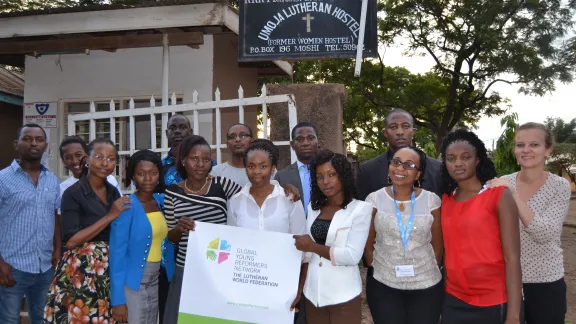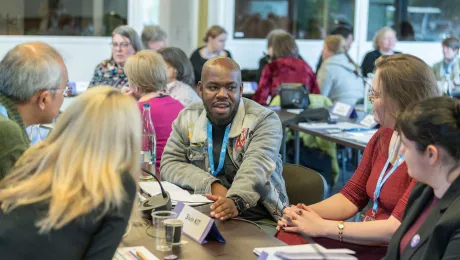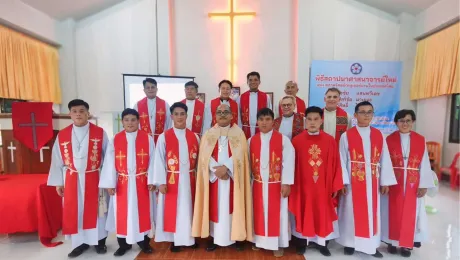
Young Lutherans say they need to be clear about their role in the church. Photo: LWF/Nengida L. Johanes
Young African Lutherans take on the challenge of the Reformation
African members of the Global Young Reformers Network attending the 60th anniversary of the Lutheran communion in Africa held a one-day workshop, 19 May, to deliberate on the theme “Liberated by God’s Grace.” Afram Pete and Neng’ida Lairumbe, from the African Lutheran Communication and Information Network interviewed some participants. The following impressions highlight the youth expectations from the meeting, their views on participation in church and the challenges they face.
What are your expectations of youth?
Caroline Richter, LWF Youth Secretary: This generation of youth has the possibility of global connectivity. This is new and unique. There is a changing understanding of what it is to be Lutheran. More possibilities for connection locally, regionally and globally are influencing this. Youth love their church and feel the need for change while maintaining what we have as Lutherans.
Mami Brunah (Madagascar), LWF Council member: We have to find out how we can accommodate the demands of the youth eg for music and dancing. As we celebrate the Reformation, we remember that we are free but in our worship there is a lack of freedom. We need intergenerational dialogue. This will enable us to bring to the attention of the older generation, the youth’s need for change, so they can accept the youth.
What is your take on the decreasing attendance of church services by youth today?
Richter: This is not new to this generation as it has been witnessed in the past. All over the world, Pentecostal churches have found more ways to bring in young people. They have made their worship attractive to the youth through music and other ways. We too have to find ways in which our youth will be more active in church. We have to figure out what can make us Lutheran and contemporary without changing the meaning of being Lutheran.
What message do you expect from the youth at this meeting?
Brunah: This is the first consultation at which the youth have been allocated time to meet by themselves on the sidelines of the bigger conference. It has enabled them to share their point of view.
Richter: We will not have a youth statement per se but we will give our input which will be integrated into the whole message of the Africa Lutheran Church Leadership Consultation.
What challenges facing the youth have you observed?
Richter: One of the issues I have heard for some time in all regions of the LWF communion is with regard to Lutheran identity, ie what is it? We need to perhaps translate the small and large Catechisms by Martin Luther into a language that can be understood by all the younger generations so they can easily grasp the meaning of being Lutheran.
Pascal Kama, General Secretary, Lutheran Church of Senegal: It is about our identity. We live in a connected world so the issues are more complex. We need to know who we are now in the context of the 500th anniversary of the Reformation. We need to be clear on who we are as youth in the church. It should no longer be that older people will speak and we do. We as young people need to bring our gifts to the church.
This is not the first time you are attending such an LWF conference, in which ways are they helpful?
Kama: The Lutheran church in Senegal is very small (with around 4000 members) in comparison to the Roman Catholics and the Muslims. But when you know that there are other Lutherans globally and that you are not alone anymore it encourages you. Also, when you get together with the others you learn a lot from each other.
The views expressed in this blog are those of the author, and not necessarily representative of Lutheran World Federation policy.


